
Daily Excelsior:
Srila Prabhupada by Vipin Vihari Dasa
It seems that Prabhupada was his whole professional life working in a higher position of an organizer and manager. In one
letter in October 21, 1947, to the proprietor of the Aska Distillery, he ends his letter by writing "Yours faithfully, For Vimaltone Laboratories Ltd., Abhay Charan De, Director in chief." When one works ones whole professional life in such positions of management its quite natural and also necessary to learn and know how to manage people in such a way so that they may do that one may be expecting out of them or that what one may want them to become one day. But at the same time I would say that Prabhupada was somehow also fully convinced that what he is teaching or expecting from his disciples is for their own spiritual good and for the pleasure of God and is not meant to satisfy his own personal desires and whims.
The reason I was quoting again some parts from the here posted conversation with Prabhupada was that one may could become better aware of what he was saying actually. You wrote before: "I red this conversation of Prabhupada with his disciples where he told Harikesha: you can't apply to Krishna directly, only through your spiritual master."
It seems that you missed somehow that he also said, I quote: "Prabhupada: Spiritual master... Krishna is also spiritual master." Than Harikesa continues: "In other words, if I am in your absence and I am in great doubt, and I am praying to Supersoul to please save me somehow, if I receive some action which I must do or some course of action becomes obvious, should I trust that, considering that you're communicating with me, or...?
Prabhupada: That depends on purity. If one has become pure, without any material desire, then that is possible. But if there is some material desire, we cannot expect direct communication."
It seems to me that contrary to that what some people may say is, that Prabhupada was not really oposed to listen and follow to the Supersoul, the caitya guru within, rather he is of the opinion that one has to become somehow able, he calls it become purified from ones "material desire"s, in order to distinguish that what one may think is coming directly from the Supersoul, the caitya guru and that what our own mind and whims or personal desires may expect or dictate to us. Of course Prabhupada seems to have been also a traditionalist who was in favour of that what one may can learn from the past instead of trying to experiment in the way a progresists like Hari and others like him may also be in favour of. That shows also the following conversation with Prabhupada I found today on the internet. An interesting article in this regard one can read also on the Science Forum homepage where one can read:
"He who is possessed of supreme knowledge by concentration of mind, must have his senses under control, like spirited steeds controlled by a charioteer." says the Katha Upanishad (iii, 6). From the Vedic age downwards the central conception of education of the Indians has been that it is a source of illumination giving us a correct lead in the various spheres of life. Knowledge, says one thinker, is the third eye of man, which gives him insight into all affairs and teaches him how to act.
Continued...
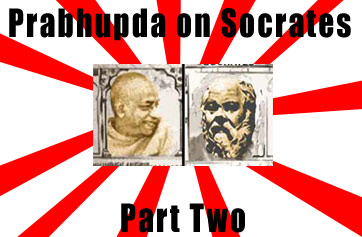
-
Prabhupada on Socrates
So goodness is the position where you can get knowledge. And passion and ignorance is not the platform of knowledge. Therefore the endeavor should be how to bring persons in the basic or base platform… So this is very easily done by our, this Krsna consciousness movement. If one hears about Krsna, or God, then gradually he becomes freed from the clutches of darkness and passion, and actually he then comes to the platform of goodness.
Hayagriva: One last point on Socrates. For Socrates…
Prabhupada: Now this so-called civilization is darkness. That is my point.
Hayagriva: Yes.
Prabhupada: It is not in the light. They are fighting within darkness. Just like if immediately this room become dark, everyone (indistinct). There is fighting. Stop it. You are asking me, “Prabhupada, where you are?” I say “Here,” and you are going in the other room.
Hayagriva: Well he pictures in the cave the, something like a cinema, on the wall of the cave…
Prabhupada: Yes.
Hayagriva: …and everyone is sitting in the cave looking, absorbed in the cinema, these forms that are not actual forms but are imitation forms.
Prabhupada: But that means darkness.
Hayagriva: Uh huh.
Prabhupada: Darkness, you are saying, “Prabhupada, I am here,” and I am looking here: “Where you are?” So that is the position of darkness. Everything you see, it is not clear. That is darkness. Therefore Vedic version is, “Don’t remain in darkness. Come to the light.” That light is guru. Ajnana-timirandhasya jnananjana-salakaya. This is guru’s description. When we are in darkness of ignorance the guru, spiritual master, ignites the torch of knowledge. Ajnana-timirandhasya jnananjana-salaka. Salakaya means torch. Then he sees, “Oh, things are like this.” In this way, when he becomes self-realized, brahma-bhu, then he becomes happy, brahma-bhutah prasannatma na socati [Bg. 18.54]. That is civilization, to get the light. And to remain in the darkness and struggle for existence, that is not civilization; that is animal life. It has no value. That is going on. Therefore we are trying to give Krsna consciousness, the greatest contribution to the human society. Krsna consciousness we are not manufacturing, we are not bluffing like other swamis and yogis and philosophers. We are simply carrying the light, torchlight, which Krsna has given. That’s all. So our business is very easy—very easy and beneficial and practical.
Hayagriva: The good that Socrates speaks of is not the same as sattva-guna. This is a quotation from The Republic. Socrates says, “This, then, which gives to the objects of knowledge their truth and to him who knows them his power of knowing is the form or essential nature of goodness.”
Prabhupada: Yes.
Hayagriva: “It is the cause of knowledge and truth, and so while he may think of it as an object of knowledge, he would do well to regard it as something beyond truth and knowledge, and precious as these both are, of still higher worth. And just as in our analogy light and vision were to be thought of like the sun, but not identical with it, so here both knowledge and truth are to be regarded as like the good, but to identify either with the good is wrong. The good must hold a yet higher place of honor. The objects of knowledge derive from the good not only their power of being known, but their very being and reality, and goodness is not the same thing as being, but even beyond being, surpassing it in dignity and power.”
Prabhupada: Yes. So goodness is the position where you can get knowledge. And passion and ignorance is not the platform of knowledge. Therefore the endeavor should be how to bring persons in the basic or base platform, ignorance and passion. So this is very easily done by our, this Krsna consciousness movement. If one hears about Krsna, or God, then gradually he becomes freed from the clutches of darkness and passion, and actually he then comes to the platform of goodness. And when he is perfectly in goodness, then this passion and ignorance and their by-products cannot touch him.
Tada rajas-tamo-bhavah kama-lobhadayas ca ye, nasta-prayesv abhadresu, nityam bhagavata-sevaya, bhagavaty uttama-sloke, bhaktir bhavati naisthiki [SB 1.2.18]
Tada rajas-tamo-bhavah, kama-lobhadayas ca ye, ceta etair anaviddham… [SB 1.2.19]
If we hear Bhagavatam, Bhagavad-gita regularly, then we become free from the effects of the modes of ignorance and passion, gradually, although it takes… But it is sure. The more you hear about Krsna, or—Krsna means His instruction or about Him, what He is—the more you become purified. So that is the test, that how one has become purified means one is purified from the base quality of passion and ignorance, means that he is no more attacked by greediness and passion. That is the test. That means he is free from the base qualities, and he is situated, ceta etair anaviddham sthitam sattve prasidati. When he is no more disturbed by these base qualities of passion and greediness, then he is happy. Then he becomes happy. Ceta etair anavi…, sthitasya, that is goodness. That is goodness. Then he is happy, happiness, that the ultimate stage of goodness is brahma-bhutah, to realize himself, realize God. So goodness, one must come to the platform of goodness. So we are therefore asking people to give up these base qualitative activities—illicit sex and meat-eating and drinking or intoxication and gambling. These are base qualities. So anyone gives up these qualities, he remains in the sattva-guna. And then if he is promoted farther, just like Socrates said that goodness is not all, that still you have to…, and that is bhakti. Then his realization is perfect. He becomes liberated, and then gradually he develops love of God, then he is in the original state. Bhaktir hitva anyatha. As mukti, liberation, means that to be free from this all nonsense engagements. Nitya-baddha, they are engaged, all these karmis, jnanis, yogis, they are simply engaged in some false engagements to become happy. So when one is free from these false engagements, then he is in the liberated state. Mukti means muktir hitva anyatha rupam. Anyatha rupam means he is acting otherwise. So one has to come to the real position, not work, act otherwise. So he is eternal servant of Krsna. When he fully engage himself in the service of Krsna, then he is liberated, and if he keeps himself, then nobody can touch, the maya cannot touch. Daivi hy esa gunamayi mama maya [Bg. 7.14]. Maya is very strong, but if one keeps in touch with Krsna constantly, maya has no jurisdiction. Mayam etam taranti te. This is perfection of life.
Hayagriva: Transcendental to the modes.
Prabhupada: Yes. No more affected by the modes of material nature. Sa gunan samatityaitan brahma-bhuyaya kalpate [Bg. 14.26]. Such person is transcendental to the modes of material nature. Sa gunan samatityaitan brahma [Bg. 14.26]. That is brahma-bhutah stage. So every devotee, if he is strictly following the rules and regulation, he is in the brahma-bhutah stage. Just like there is epidemic, but one who has taken the vaccine, the epidemic cannot touch it. So that is like that. Brahma, when you come to the brahma-bhutah state, let…, there may be maya, there may be so many activities of ignorance and passion—he has nothing to do with. He is free. That is brahma-bhutah state. That is wanted. That is perfection.
Hayagriva: So that’s the conclusion of the additional notes on Socrates, Srila Prabhupada.
Prabhupada: Yes, it was very, very nice.
Hayagriva: And if new philosophers that we will present eventually, oh, um, I don’t know if these were ever…
Prabhupada: Actually the main philosophy is Socrates. He is (indistinct).
Hayagriva: Socrates, Plato, Aristotle, these have been done. Just a little, a few additions. But then there’s Plotinus, Origen, and Augustine, and these were the three philosophers who shaped Christian thought or Catholic, the Church thought, Church fathers, and St. Anselm, St. Thomas Aquinas, Scotus and Eckhart, these are Christian…
Prabhupada: So they are not philosopher; they are Christian with different point of views. So we are not going to discuss with a person he is from the stand…, deviating from the standard way and thinking in their mental speculation.
Hayagriva: But these, these are considered philosophers…
Prabhupada: Considered, but because they belong to a certain sect of religion…
Hayagriva: Because they are followers of Christ?
Prabhupada: Yes. And they are deviating from the original Christian father, so they are useless.
Hayagriva: They do, they do deviate. They…
Prabhupada: No, you can not deviate. Then no more you are Christian. So you can…, you have no platform to talk from the Christianity. Therefore they should be rejected.
Hayagriva: Uh huh. So Plotinus was not Christian, neither was Origen…
Prabhupada: If you say Christian, you must follow the four…, ten commandments of Christ. If you don’t follow, you make your own ways to escape, then you are no longer Christian. So you cannot talk.
Hayagriva: But Augustine was one of the ones who maintained that animals do not have souls.
Prabhupada: Therefore he is a rascal.
Hayagriva: Yes.
Prabhupada: He is a rascal.
Hayagriva: And this was accepted…
Prabhupada: Now, what do you, what do you use, what the use to talking with a rascal? It is waste of time.
___
Related reading:
Prabhupada on Socrates Part One -
Part Two
Yes. That is our opinion. Beauty, knowledge, strength and opulence—everything—they are transcendental. Here, in this material world, it is perverted reflection. Just like … (
more...)
Democratic Government
The so called democratic government means some of the sudras, rascals without any knowledge of the highest aim of life. By hook and crook they get some votes and get the respo… (
more...
Love, Ego, Truth, Knowledge
Our desire to love someone here in this earthly planet is a reflection of our original desire to love Krishna. Krishna is so kind; He has no reason to be hungry, He has everything… (
more...) -
More Reading...
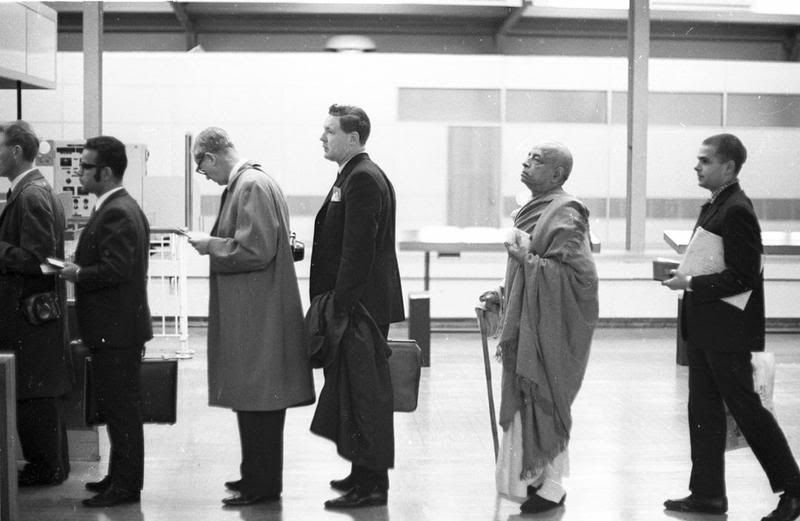
Prabhupada in London Airport
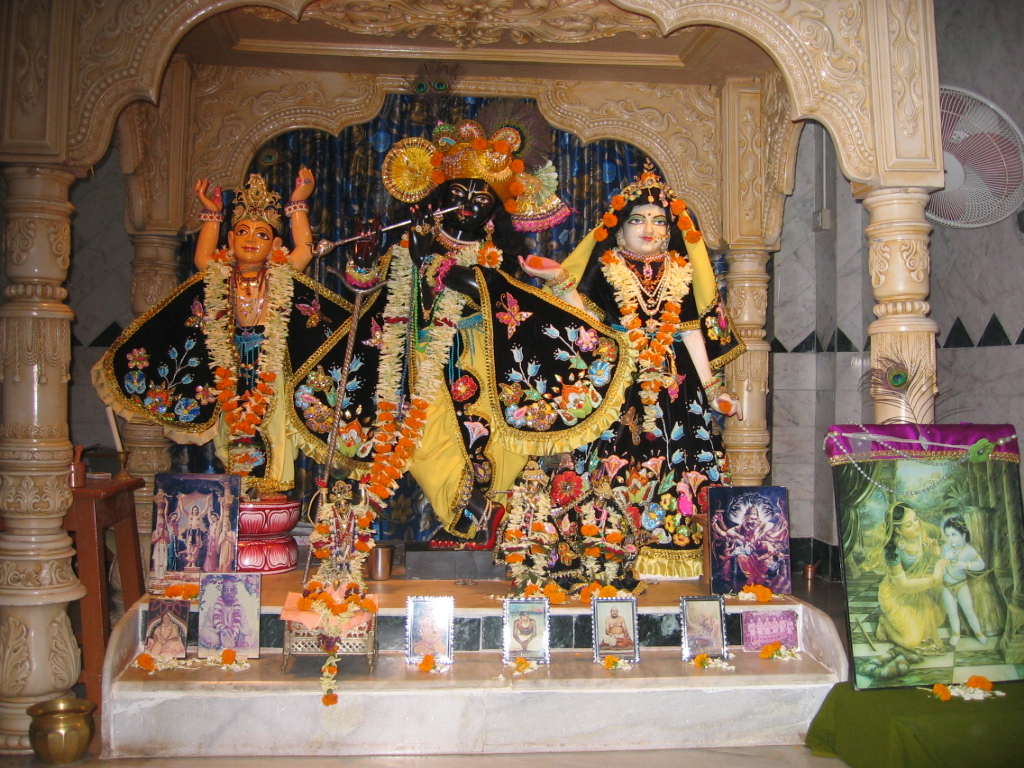
 - Iskcon News: Bangalore Splinter Group Wins Court Case - Madhu Pandit Info
- Iskcon News: Bangalore Splinter Group Wins Court Case - Madhu Pandit Info
 - Info by Rocana Dasa - - TKG's Confession - Web links...
- Info by Rocana Dasa - - TKG's Confession - Web links... - Jagannath Temple of Puri
- Jagannath Temple of Puri 
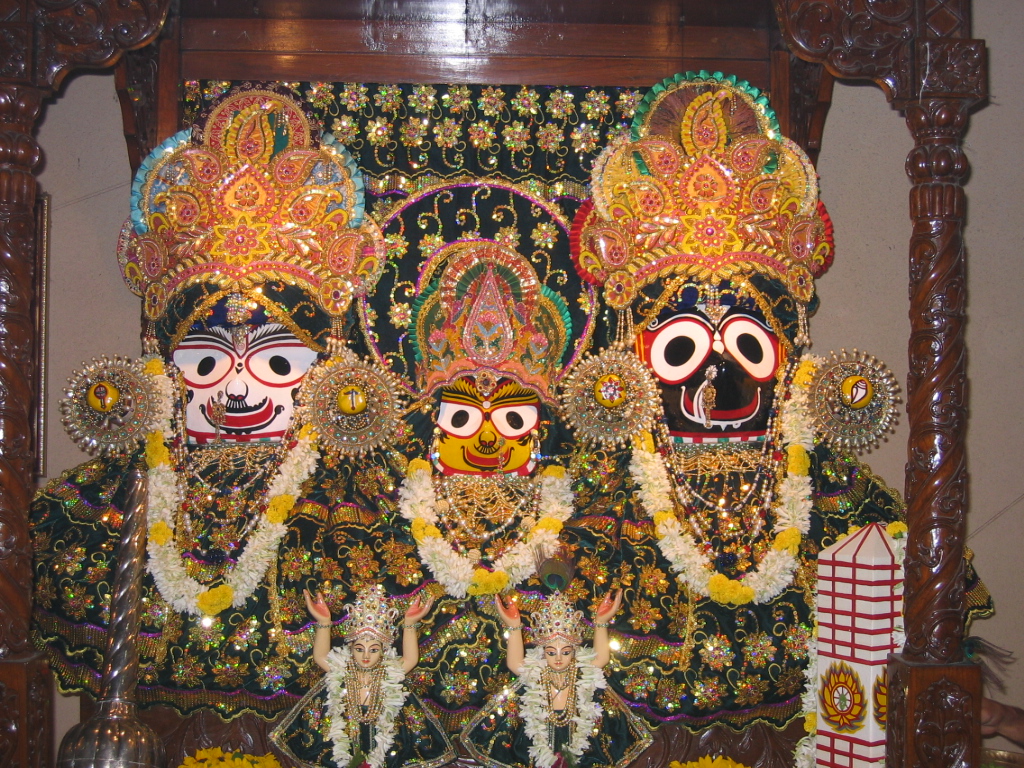
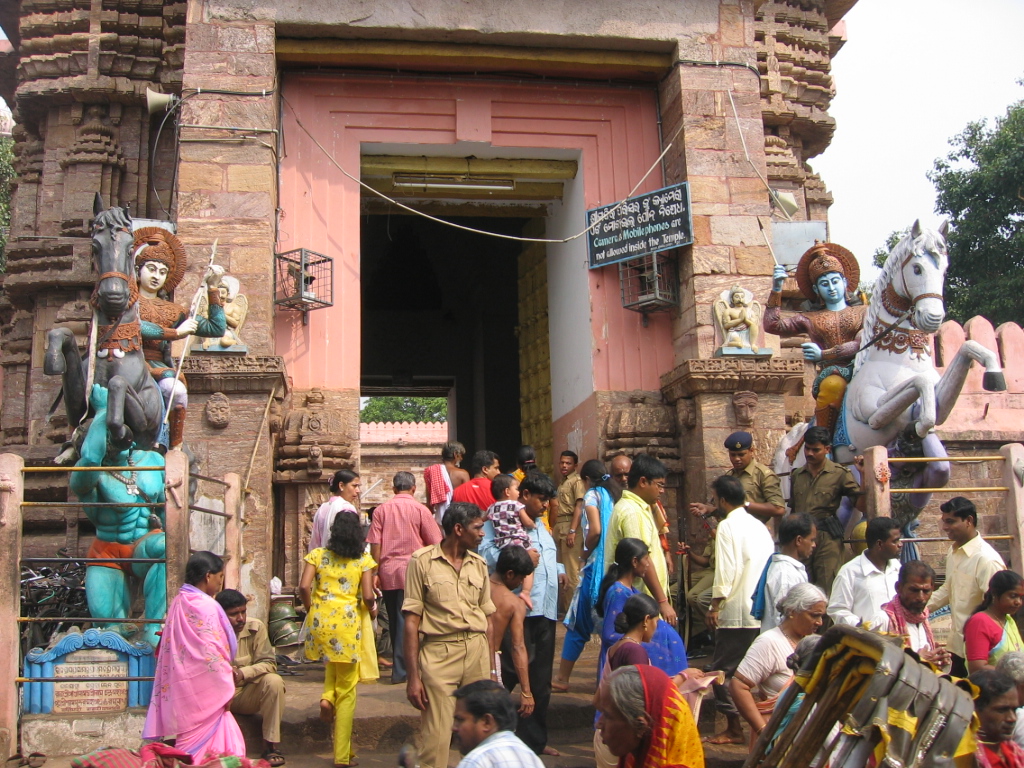 Entrance to the Gundica mandir
Entrance to the Gundica mandir
 Daily Excelsior: Srila Prabhupada by Vipin Vihari Dasa
Daily Excelsior: Srila Prabhupada by Vipin Vihari Dasa - Prabhupada on Socrates
- Prabhupada on Socrates Prabhupada in London Airport
Prabhupada in London Airport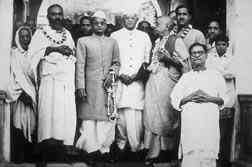 - Prabhupada in Vrindavan 1964 with the governor of Uttar Pradesh.
- Prabhupada in Vrindavan 1964 with the governor of Uttar Pradesh. - Prabhupada’s Use of Words Like “Fools” and “Rascals” - Links / 2
- Prabhupada’s Use of Words Like “Fools” and “Rascals” - Links / 2 - Prabhupada's Vrndavana garden - Web Photos - Videos
- Prabhupada's Vrndavana garden - Web Photos - Videos - Prabhupada, The Photo book
- Prabhupada, The Photo book  Radhakunda.com
Radhakunda.com 
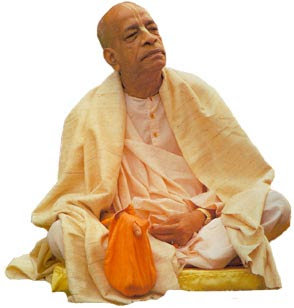 A.C. Bhaktivedanta Swami, Prabhupada's Journey to the USA.
A.C. Bhaktivedanta Swami, Prabhupada's Journey to the USA. • From Wikipedia
• From Wikipedia • http://www.jaladuta.com
• http://www.jaladuta.com
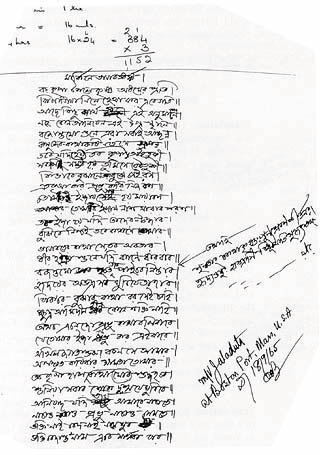 • The Prabhupada Story
• The Prabhupada Story • Photos
• Photos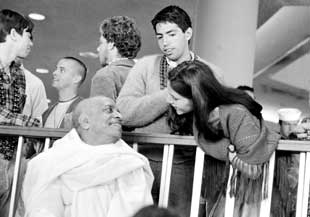 • Mukunda and Janaki, his first female disciple
• Mukunda and Janaki, his first female disciple - Changes at Prabhupada's Books - Prabhupadanugas.eu
- Changes at Prabhupada's Books - Prabhupadanugas.eu

